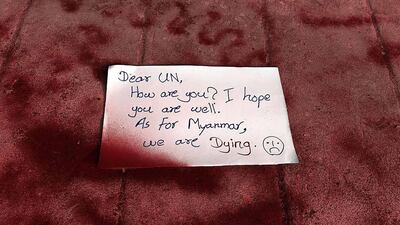The economic fallout from Myanmar’s coup and the deadly crackdown on pro-democracy protesters amid a coronavirus pandemic threaten to plunge 12 million people into poverty, the UN said on Friday.
A study by the UN’s Development Programme (UNDP) said the double whammy of Covid-19 and Myanmar's political crisis, triggered by a military coup on February 1, could leave about half the population, some 25 million people, in poverty by 2022.
The report came amid heightened efforts by UN diplomats and South-East Asian leaders to bring an end to the violence in Myanmar, where activists say more than 750 people have been killed in the military’s brutal post-coup crackdown.
“Without functioning democratic institutions, Myanmar faces a tragic and avoidable backslide towards levels of poverty not seen in a generation,” said UNDP administrator Achim Steiner.
By the end of last year, some 83 per cent of households had reported their incomes had been cut almost in half due to the pandemic, said the UNDP's 26-page study, Covid-19, Coup d'Etat and Poverty.
The number of people living in poverty has risen by 11 per cent due to Covid-19 and may quickly grow another 12 per cent amid the turmoil of mass protests, strikes and the violent suppression of demonstrators by security forces.
Poverty in the capital Naypyitaw, Yangon, Mandalay and other urban areas is expected to triple, while the putsch-fuelled chaos has fractured supply chains and hindered flows of people, services and goods, researchers said.
Pressure on Myanmar's currency, the kyat, has pushed up the price of imports and energy, the report said, while the banking system has been paralysed amid a series of workplace walkouts.
“In the space of 12 years, from 2005 to 2017, Myanmar managed to nearly halve the number of people living in poverty,” said Mr Steiner.
“The challenges of the past 12 months have put all of these hard-won development gains at risk.”
The European Union’s high representative for foreign affairs and security policy, Josep Borrell, on Friday said the bloc was ready to offer its support to all parties to help restore democracy, in response to last week’s crisis talks between Asean leaders.
The UN envoy to Myanmar, Christine Schraner Burgener, again briefed the UN Security Council on Friday on the issue.
After the closed-door talks, India’s UN ambassador T S Tirumurti called for the “release of detained leaders and an end to violence”.
The Security Council has condemned the violence against protesters, but has not called the military takeover a coup or threatened any reprisals, due to opposition from China, Russia and other members.
UN spokesman Farhan Haq on Friday called for the release of political detainees and respect for human rights and, in answer to a question from The National, said council members "have a role to play in putting up a united front".
The UNDP report showed the “steep economic costs the people of Myanmar are paying for the deterioration since February 1, and that tells you a lot about why it is to the advantage of all sides to get back to the situation that we had in place beforehand,” Mr Haq said.
Myanmar has been in turmoil since the military overthrew the elected government of Aung San Suu Kyi, detained her and other civilian politicians, then cracked down with lethal force on anti-coup protesters.


